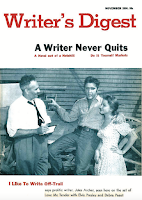Elvis biographer Paul Belard added another volume to his visual biography series titled ‘Elvis - Hollywood Bound - August 16 To 31, 1956’, detailing the last two weeks of August, 1956.
Design
The book is mainly a picture book. It follows Elvis day-by-day style through photographs. The design is the same as the previous volumes in this ongoing series. Added to the visual element are short explanatory texts for the photos, some memorabilia and snippets from newspapers and magazines.
As the images are sourced from various sources, and Belard decided to add them all, there is quite some variation in the quality of the images. You can consider it the price of being as complete as possible.
This volume also contains quite a few colorized pictures. Some look good, and make the pictures look more lively on the black background, but it doesn't work on all photo's for me. Especially on classic pictures I know so well in black and white. On the cover it works great though, Elvis really stands out.
Content
Many fans will own the two FTD titles or Erik Lorentzen's 'The Reno Brothers’ covering this period in time. They will experience a lot of overlap with Belard's book seeing Elvis on and behind the movie-set, recording studio and with fans.
Continuing his day-by-day format, Belard fills in some open gaps on the Elvis Presley time-line, by adding images which did not appear in the before-mentioned titles. For example the many pictures taken in the Knickerbocker Hotel in Los Angeles.
What I quite liked about the book were the observations by Belard on Elvis as the man he really was, and the opinions he still shared early in his career. Like the interview with Army Archerd, a columnist for Variety magazine.
Presley took Mr. Archerd back to the music bungalow and sang 'Love Me Tender' for him. "When he finished,” wrote Archerd, “it seemed only normal to express our amazement. ‘People think all I can do is belt,’ he said. ‘I used to sing nothing but ballads before I went professional. He loved ballads, he declared, and was going to start introducing them more into his live act.”
The interview with renowned journalist Jules Archer for Writer's Digest, titled 'Stop Hounding Teenagers!', is one of the best articles written about Elvis according to Paul Belard as Archer puts an end to the “delinquency” issue attached to Elvis since his rise to fame.
At the time of this interview, Tupelo and Memphis and most of the South were still segregated. For Elvis to admit he did not care about a man’s color or religion took courage. For those who still think Elvis was a racist, this article is a must-read.
"Elvis surprised reporter, who expected a young delinquent".
In a follow-up article Archer even reiterated his impression of our man. He wrote: "As we conversed, I found him to be just an everyday boy from the Mississippi Delta. He was very polite and deferential to me as his elder, answering my questions with a bright “Yes, sir.” I learned that he didn’t drink or smoke, was bored by nightclubs and liked to relax by throwing baseballs at wooden milk bottles and winning teddy bears. Deeply religious, he was a home boy who frequently grew lonesome away from his parents.
After dinner, an elderly maid came to remove the dishes. She broke into our conversation to tell Elvis how much her grandchildren enjoyed his singing and asked for his autograph. Instead of being annoyed by the interruption, Elvis smiled. With great warmth, he told her, “Ma’am, it’s very nice of you to say all those kind things about me, and I greatly appreciate it.” He autographed a napkin for her.
That cinched it for me. Elvis was a nice kid, not at all a delinquent type. He truly was one of the nicest youths I’d ever met - certainly one of the most polite and most respectful.
Still, I never did learn to like rock ’n’ roll!."
Conclusion
Besides the pictures, the articles above were the main attraction for me. As noted in the reviews of Pål Granlund and David English (>>> read 'Elvis Day By Day 2018 - The Year In Review') Elvis was still very approachable in 1956 - allowing photographers to take pictures while he was changing clothes - and he was still very open about his opinions and beliefs to reporters.
Somehow this side of our man did not always make headlines. Perhaps it was just because he was considered a 'juvenile delinquent', and, based on that image, was portrayed as such. And maybe it also helped to sell some more records for this first "punker who scared many parents".
Elvis was well aware of this, and before the interview for Writer's Digest he said: “Mr. Archer, I hope you’re not going to make up a lot of things I never said. A lot of other writers have done that to me, and I don’t think it’s fair.”
In this book “Elvis speaks” and Paul Belard put the record straight!
The book is available on Amazon or directly from Belard at pbelard@hotmail.com





